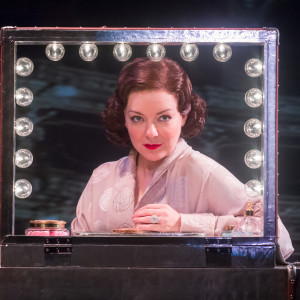Funny Girl, Menier Chocolate Factory
 It’s hard not to invoke the B word – Barbra, that is, not Brice – and I speak as one who bunked off school to catch her at a mid-week matinee. It was standing room only at the Prince of Wales but by then she was pretty much phoning in her performance and only the thrill of that voice (smaller than one expected but laser intense) carried her through. It’s quite the reverse with the very talented Sheridan Smith who is a funny girl and probably closer in spirit to the real Fanny Brice than Streisand could ever be – and with Isobel Lennart’s book now effectively sharpened by Harvey Fierstein for this brand new Michael Mayer staging (and all the Broadway credentials that go with him) the focus is now pulled away from the hit songs towards the comedy and with it the heartache that lies beneath. Fanny’s success effectively kills her romance and – irony of ironies – still she has to make people laugh.
It’s hard not to invoke the B word – Barbra, that is, not Brice – and I speak as one who bunked off school to catch her at a mid-week matinee. It was standing room only at the Prince of Wales but by then she was pretty much phoning in her performance and only the thrill of that voice (smaller than one expected but laser intense) carried her through. It’s quite the reverse with the very talented Sheridan Smith who is a funny girl and probably closer in spirit to the real Fanny Brice than Streisand could ever be – and with Isobel Lennart’s book now effectively sharpened by Harvey Fierstein for this brand new Michael Mayer staging (and all the Broadway credentials that go with him) the focus is now pulled away from the hit songs towards the comedy and with it the heartache that lies beneath. Fanny’s success effectively kills her romance and – irony of ironies – still she has to make people laugh.
The really special thing about Sheridan Smith is her openness and big-heartedness on stage. She, like Fanny (but unlike Streisand), is a natural comedienne – she simply can’t help being funny; the timing, the 36 expressions, the goofy throw-aways, all of it is inbred. She works because she’s real. And we love her for it. That’s what the dashing card-shark and all-round wheeler-dealer Nick Arnstein (the suave and ebony-voiced Darius Campbell) falls for and that’s the dynamic that makes the show tick. All the foreplay between them – in numbers like “You are Woman, I am Man” – is designed to establish an unlikely laugh-a-minute mis-match and it’s only when things get serious and Fanny’s devotion (along with her new-found wealth) begins to encroach upon Nick’s autonomy and pride that the romantic downturn is signalled.
Will he/won’t he stay with her? Is that enough drama for one musical? It is and it isn’t. Smith and Campbell play it beautifully and their final scene together is pitch-perfect, genuinely touching. So what is it that’s missing? Well, Jule Styne’s terrific score sounds thoroughly authentic in Chris Walker’s clever arrangements, the ten-piece band retaining the brassy pizzazz of the far more elaborate originals. There are flavoursome individual turns like Joel Montague’s Eddie who moves like he’s slight and wiry when he’s anything but; and there’s the delicious coven of Jewish poker-playing seniors – Gay Soper, Valda Aviks and the lovely Marilyn Cutts as Mrs Brice – whose bluffing extends far beyond the card table.
But this score belongs to the lady in the title role – she has all its greatest numbers – and whilst Sheridan Smith can carry them on the sheer force of her personality and her belief in each and every lyric the singing per se never arrives at that place where it can knock your socks off. The tessitura of “People” is tough for her and where you need vocal intensity you don’t quite get it. Likewise the greatest song in the show “The Music That Makes Me Dance”. If only that other voice wasn’t nagging away in our subconscious.
The show is obviously going to grow in size and Ziegfeld-like scale for its West End transfer but Michael Pavelka’s evocative set cleverly conveys a more elaborate context for the show than the tiny Menier Chocolate Factory really allows. And there is a wonderful moment where the essence of what Sheridan Smith is striving for here is thrown into poignant relief. At the close of act two’s “Rat-Tat-Tat-Tat” production number Fanny, absurdly padded out as the squat and jokily moustachioed Sergeant Schwartz, is left alone on stage – the ubiquitous sad clown who minutes before had the audience eating out of the palm of her hand. Smith can do that – but truth to tell the book fairs better than the score.
You May Also Like

GRAMOPHONE Review: Sounds of America – Jon Manasse, Park Avenue Chamber Orchestra/Bernard
20/12/2021
GRAMOPHONE: From Where I Sit – June 2021
18/06/2021